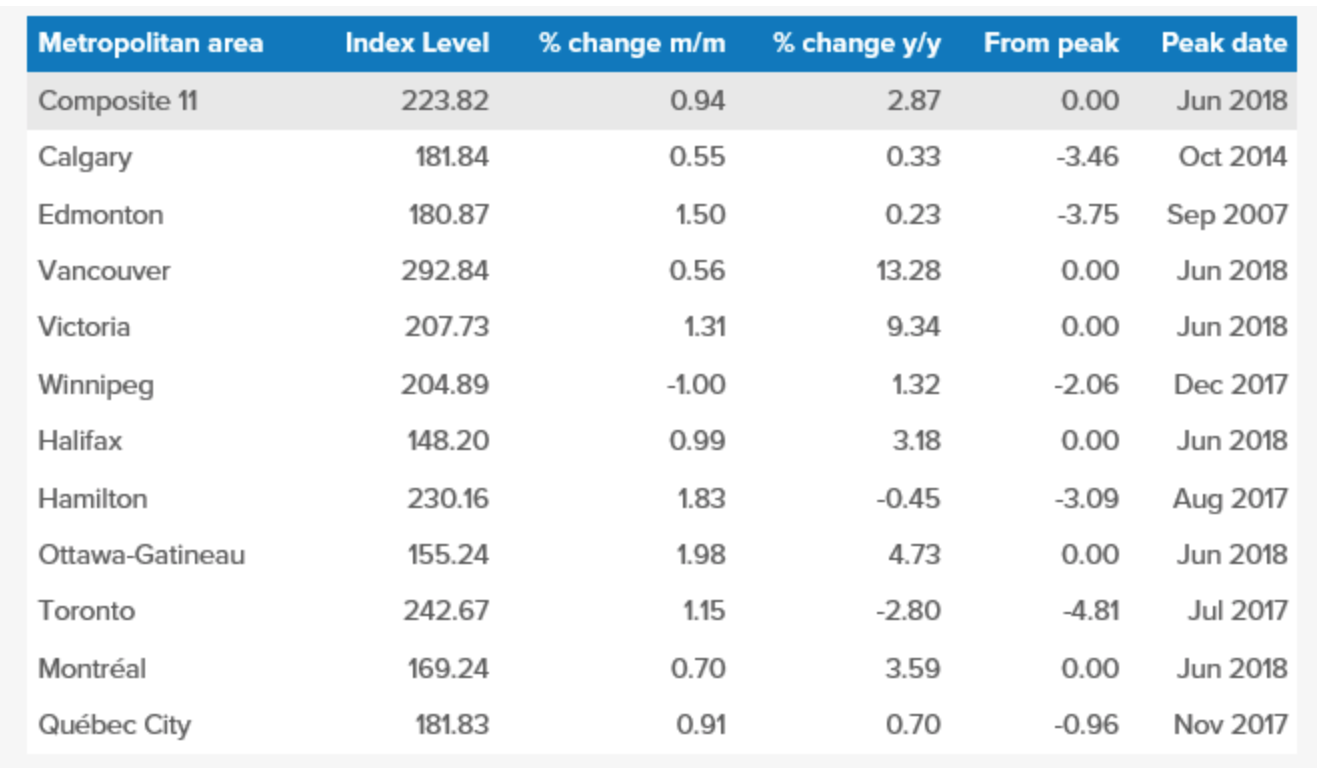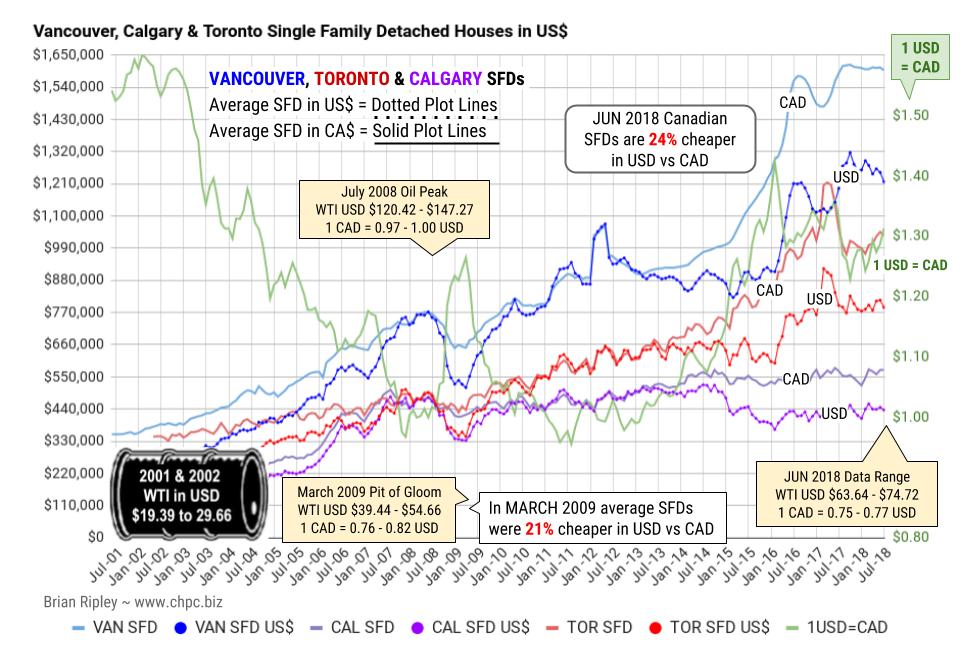Real Estate
“Five of the 11 markets reached a new high in June: Vancouver, Victoria, Montreal, Halifax and Ottawa-Gatineau. The market furthest from its previous peak was Toronto, down 4.8% from its reading of last July…Over the first half of the year (2018) the Toronto index rose at an annual rate of 5.7%. For the condo segment, the rate was 12.1%, for other housing only 2.9%, reflecting a tight seller’s market for condos. The Vancouver story is similar: condo segment up 17.6% annualized since last September, other dwelling types up 4.9%.” (The Teranet–National Bank National House Price Index, July 12, 2018)
Housing prices Canada’s 11 metropolitan areas increased 0.9% in June, as 10 of the 11 urban centers recorded monthly increases, led by Ottawa-Gatineau (+2.0%) and Hamilton (+1.8%).
House prices in Toronto rose 1.2% in June, suggesting that some price stabilization was occurring in the country’s biggest city. The Toronto housing market (excluding condos) recently weakened after the provincial government adopted measures to rein in the market. As well, tighter mortgage rules took effect at the start of 2018 which also hurt housing prices. The Toronto house price index is down 4.8% from its peak in July 2017.
On a year over year measurement basis, however, Canada’s housing prices have been clearly slowing, with the latest aggregate increase at just 2.9%, the lowest increase since October 2013.
As of June, the annual price winners were Vancouver (+13.3%), Victoria (+9.3%), Ottawa-Gatineau (+4.7%), Montreal (+3.6%) and Halifax (+3.2%), while housing prices in Toronto fell 2.8%.
A snapshot of housing prices over the past five years also confirms that a slowing pattern that has emerged.
Over the past five years, average housing prices in Canada have increased about 46%, with the peak rate of increase occurring around mid-2017. Since then, as the second chart illustrates, the average rate of house price increase has decelerated sharply from about 14% per year to less than 3% recently.
In sum, Canada’s recently hot housing market has softened in the wake of four interest rate hikes by the Bank of Canada since July 2017 and the imposition of tighter mortgage rules, though the condo markets in both Toronto and Vancouver have remained quite robust.
Tighter mortgage rules have priced many buyers out of the more expensive single-family home purchases.


The latest Housing and Mortgage Market in Canada report by Mortgage Professionals Canada revealed that stricter government measures are pushing consumers towards a more negative outlook for housing and real estate nationwide.
In particular, the study pointed at increasing interest rates and tighter mortgage qualification requirements as the main factors eroding Canadian consumers’ sentiments, despite many respondents still indicating a belief that real estate remains a good investment.
“We are still seeing a high level of desire in home-buying, especially among young people aged 25-34,” MPC president and CEO Paul Taylor said. “Whether they will be able to make that purchase may be an entirely different matter.”
Read more: Property investment in Canada still showing robust activity, demand
“We support a stress test, albeit at a reduced rate of 0.75%, as it is a useful tool to test a borrower’s ability to make future payments,” Taylor added.
“However, the cumulative impact of rising rates, a 2% or greater stress test, provincial government rules in Ontario and British Columbia, and further lending restrictions are negatively supressing housing activity not just in Toronto and Vancouver, but throughout the country.”
The report warned that federal policies which would lead to a decline in housing prices will trigger a reduction in home equity, thus further wearing down consumer confidence and leading to shrinking spending, slower economic growth, and reduced jobs creation.
Related stories:
Vancouver wage levels aggravating housing woes
Non-Toronto markets in Ontario see accelerated home price growth
Canadian housing data continued to disappoint in the month of June. As sales dipped, so too did the total amount spent on real estate. The total dollar volume dipped 12% year-over-year in June, totaling C$23.5 billion. A tough blow to government tax coffers which have reaped record sums of property tax dollars in recent years…. CLICK for the complete article
In June 2018 a single family dwelling in the hot metros of Vancouver, Calgary and Toronto is now 24% cheaper if purchased in USD as opposed to CAD. They were 28% cheaper in February 2016 and at the March 2009 Pit of Gloom, prices were 21% cheaper in USD.
The ensuing commodity price spike blew out first in oil and housing in 2007-08 with the propellant of a low CAD exhausting itself at par at the 2008 peak.
Going into the March 2009 crash the FX spread widened to 21% cheaper Canadian housing in USD and then the tracks were replaced with slick new central bank high speed ZIRP rails and housing no longer needed to catch a ride on the commodity train but went air borne on a maglev of credit.
On this hyper ride the CAD quickly accelerated and by the spring of 2010 only a year after the Pit of Gloom the world traded Canada at par with the US on energy and housing. But then the CRB Commodity Index priced in USD blew out in the spring of 2011 and then in the fall of 2013 spot oil reversed to the downside. The cyclical change in trend has been set.
Enthusiasts for Canadian housing denominated in CAD may have now come to realize that a switch has been thrown. Calgary housing values have been shunted onto a siding and the brakemen are now working in Toronto, and Vancouver.
Canada’s prime market for high-priced real estate until recently, Vancouver has been unceremoniously knocked off that perch, according to findings of a Sotheby’s report published July 10.
The luxury brokerage’s 2018 Mid-Year Top-Tier Report examines $1 million-plus market activity across the country. It found that sales of $1 million-plus homes in Vancouver fell 19 percent in the first six months of 2018, compared with the same period in 2017, and that this decline was led by…. CLICK for the complete article
















